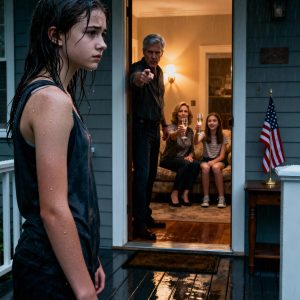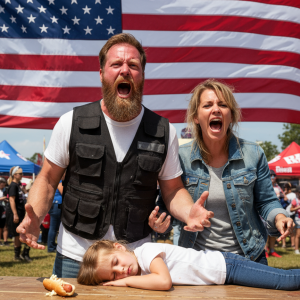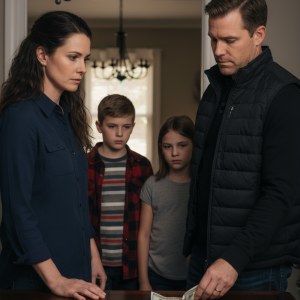The bottle of Blanton’s bourbon felt heavier than it should have, nestled in my hand like a promise of warmth and reunion. I had flown twelve hours, navigated three miserable delays, and driven another two through the dark just to surprise my husband, David, during his “guys’ weekend” at the cabin. I had wanted to remind him that love could still be spontaneous.
But just as I raised my hand to knock, his voice sliced through the thin wood of the door—and with it, my world.
“If she disappeared, the insurance payout would wipe out all my debts.”
Laughter followed. Then another voice: “And maybe you could finally make a move on her sister. Guilt-free.”
More laughter.
My grip tightened around the bottle until my knuckles went white. I blinked, thinking maybe I had misunderstood. But David’s voice came again—calm, certain, familiar.
“Two million. Took some convincing to get her to sign. Told her it was for our future family.”
It felt like the ground had shifted beneath me. I backed away, the cold mountain air suddenly suffocating. The bourbon bottle, once a symbol of affection, now seemed grotesque. I crouched and placed it quietly at the cabin door, removed the tag that said, “Love, Sophia,” and stood there watching the shadows of the men inside play cards and casually plot my death.
I had grown up in a world of wealth—my father a real estate mogul, my life wrapped in security and legacy. When I met David, I mistook his indifference to my fortune as authenticity. He was confident, passionate, and hungry for success. I saw those things as ambition. I mistook them for love.
I defended him when my father raised questions about the prenup. “He wants to stand on his own two feet,” I insisted. “I trust him.”
I dismissed my sister Amelia’s concerns when she said he asked too many questions about our family’s trusts. “He’s just curious,” I said. “He wants to be part of the family.”
Now, with the sound of his laughter echoing in my ears, every ignored warning roared back.
I didn’t confront him. I didn’t rage or cry. I got in my rental car and drove until I found a Wi-Fi signal. By the next morning, I was gone.
I bought a one-way ticket to Costa Rica under my maiden name, booked a small beachside hotel, and paid in cash. I left no digital trail. I let the world believe I had vanished.
The Pura Vida del Mar Hotel was modest. No chandeliers, no marble floors. Just peeling blue paint and salt-tinged air. Perfect.
When the owner asked, “Just you, Señora Reynolds?” I nodded.
“Yes. Just me. Starting over.”
She handed me a key to Room 8—ironic, given the number had once adorned our master bedroom door. Now, it would become a symbol of rebirth.
Each day, I let go of something old.
I tossed out my designer labels and bought cotton dresses from the local market. I cut my long, glossy hair—David’s favorite—and watched it fall to the salon floor like dead weight. I walked barefoot on the beach each morning, letting the sea scrub away pieces of my former self.
A week in, I found an art gallery run by a quiet old man named Miguel. I told him I used to paint. He handed me a sketchbook.
“Then paint,” he said.
And I did. At first, clumsy. Then fluid. My hands remembered what my heart had forgotten.
“Your paintings,” he said softly, “have sorrow. But they also have strength. That is good. Art should tell the truth.”
Eventually, curiosity got the best of me. I checked my email.
Dozens of frantic messages from David. Messages from friends. And one, surprisingly, from his sister Rebecca. She sounded terrified.
“There are men looking for David,” she said. “He owes them over $300,000. They came to my house. Said if he runs, they’ll come after me.”
I felt the click of the final puzzle piece sliding into place. The desperation wasn’t about failed business ventures—it was about gambling.
Rebecca was scared. She’d been kind to me. I told her I’d help, but only if she got David into rehab, sold her house, and disappeared from his reach.
Then came the real blow: the private investigator’s report.
David had forged a second life insurance policy on me—$5 million. He had siphoned money from our joint account into an offshore Cayman account. He had tried, and failed, to seduce my sister. He had used my love as his weapon.
So I made a plan.
I returned to the U.S. in disguise: new clothes, brown contact lenses, traveling under “Sophia Reynolds.” My attorney prepared divorce papers. My father’s security team stood ready. And I went home.
David didn’t recognize me at first when I rang the doorbell. He looked like a man unraveling. Hair unkempt. Whiskey breath.
“You’re alive,” he gasped. “I thought—”
“I was at the cabin, David. I heard everything.”
His charm flickered. He stammered, spun lies, denied.
Then I laid down the evidence: forged policies, bank transfers, texts, audio recordings. His face crumpled.
I offered him two options: sign the divorce and walk away, or I go to the FBI.
He signed.
I didn’t destroy him. I dismantled the illusion. The agreement gave him 30 days to leave the state. The debt was paid. He would never contact me, or my family, again.
Rebecca and I walked out of that house like survivors. Like women reclaiming their stories.
Three months later, I stood on the balcony of my Costa Rican studio, sea breeze in my hair, paint on my fingers. My first gallery show was sold out. Rebecca ran a small bookstore in Colorado. And David?
He vanished. The FBI opened an investigation. The world he built on lies crumbled.
I sipped my wine and watched the waves. I didn’t need revenge. I had something far greater: freedom.





